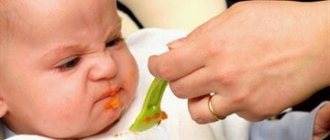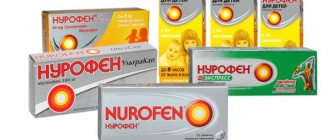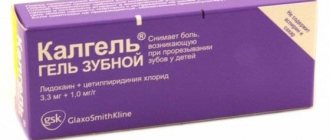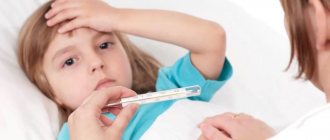A baby's first teeth are a long-awaited joy for parents. Their appearance is often accompanied by anxiety, fever, and digestive problems in the baby. These phenomena are short-term in nature and do not affect children's health. However, even a few days of the baby’s illness bring anxiety to the young mother. It is important for her to know how long diarrhea lasts during teething, and how to help the baby during this difficult period.
Teething is an important moment in a baby’s life, which is often accompanied by diarrhea. What should mom do in this case?
Why does a baby suffer from diarrhea when teething?
Teething is a serious shock for a child's body. During this period, various symptoms appear, by which the mother can determine that the baby will soon have a tooth.
These include:
- increased salivation;
- child's refusal to eat;
- fist and finger sucking;
- reluctance to sleep and walk;
- increasing moods;
- increase in body temperature.
Many mothers note that during the period of teething, the child’s stool changes. Can I have diarrhea when teething? This symptom is often found in children. It is due to several reasons.
A child is born with immunity acquired from the mother. It is formed in the womb, but after birth it does not strengthen, but, on the contrary, weakens. This is due to the fact that the child is affected by various factors from which he was protected inside the mother.
At this moment, the baby is most susceptible to various infections. And they, as you know, can cause diarrhea.
When the first teeth erupt, the child feels increased discomfort. The gums itch and hurt, so the baby uses everything he can get his hands on to relieve unpleasant symptoms. Toys, fingers, and various objects are pulled into the mouth. Viruses and bacteria from their surface easily enter the child’s body, causing infection. In this case, diarrhea during teething in a child becomes a side effect of the inflammatory process.
Also, a common cause of diarrhea during teething is increased salivation. Due to the constant swallowing of large amounts of saliva, the intestines are washed out. Therefore, as a result, the baby's stool may become liquid.
The main symptoms of teething in a child
There are no specifically established signs that appear in all children. One child goes through this period without any problems, while for another, each tooth is given with great pain.
This mainly applies to primary teeth, because permanent teeth rarely cause discomfort, with the exception of “sixes”, which is due to the size of the coronal part. There are symptoms that are commonly identified with teething:
- copious secretion of saliva is a sure sign that the baby’s first tooth will soon appear, because saliva protects against microorganisms, the entry of which into the oral cavity is increased due to the fact that the child drags into his mouth everything that comes along the way;
- swollen gums - the soft tissues of the gums increase in size, and the contours of cutting teeth are clearly visible through them. The gums hurt and itch, which is why children try to relieve discomfort by gnawing on various objects;
- change in behavior - children often become nervous and capricious, which is not surprising, because the tooth has to move along the bone and appear on the surface, which causes considerable pain;
- habit of gnawing - due to the fact that the gums are itchy, the child tries to bite hard objects, because mechanical pressure on the tissue eliminates pain;
- cold symptoms - fever, weakness and malaise may accompany teething. Active substances are produced in the growth zone, which facilitate tooth advancement and soften tissue. Sometimes local inflammation occurs in the oral cavity due to the addition of a secondary infection;
- disruption of the functioning of the intestines - the ingress of microorganisms, as well as an increased amount of saliva, lead to the occurrence of loose stools;
- runny nose - increased work of the glands contributes to the appearance of snot, which normally disappears after 2-3 days.
Symptoms
It is important for parents to distinguish teething diarrhea from another intestinal disorder. Therefore, it is worth remembering what stools are like when teething. It may become liquid, but familiar in color and smell.
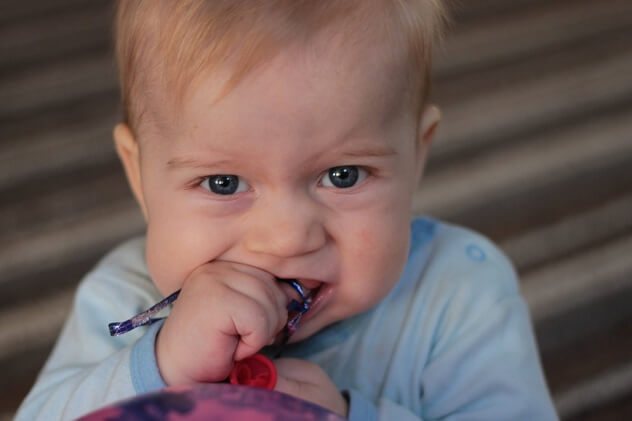
The normal frequency of bowel movements in infants is considered to be from one to several times a day. However, there is no exact meaning. How long diarrhea can last should be assessed based on the individual characteristics of the child’s body. For one baby, stool 4 times a day is considered frequent, for others – ten.
It is for this reason that it is worth not only assessing the frequency of bowel movements, but also the child’s condition at the same time. He should not be lethargic or irritated for a long time. If the child also eats well, then we can say with confidence that diarrhea is caused by an inflammatory process in the gums.
Sometimes an increase in body temperature is added to the symptoms. Don’t be scared: this is how the body’s reaction to the process of gum eruption is expressed.
In this case, diarrhea and temperature during teething are the main symptoms of malaise. If other negative signs appear, then we can talk about an intestinal infection.
Signs of an acute condition when a child is vomiting
What deserves special attention is what the symptoms of more acute conditions are if a child is vomiting. Experts pay attention to the likelihood of developing dry skin and exhaustion - in this case, a weakened child can no longer cry loudly enough, he only moans quietly. In addition, drooling, always perceived as a characteristic symptom of teething, suddenly stops.
Treatment, diet and laxatives for constipation in the elderly
Further, a baby with teething, if his health worsens, may encounter the fact that the urine turns out to be dark. If it is released, it is only in insignificant quantities. If any catarrhal phenomena occur (for example, a runny nose), then in this case it will be possible to draw conclusions about the occurrence of ARVI. When diarrhea occurs, experts most often suspect rotavirus, a symptom of which can be other conditions. Considering all this, it is very important for parents to know everything about how exactly they can cope with vomiting in a child.
How does an intestinal infection manifest?
Due to the weakening of the child's body during teething, the baby is susceptible to intestinal infections. It can be identified by a number of symptoms:
- The baby develops a high temperature. It is significantly higher than normal and acceptable values for teething. The figure can reach 39-40° C.
- The stool becomes frequent, liquid, with the presence of mucus and watery formations.
- The smell of the stool changes to sour and putrid.
- The stool changes color from yellow to yellow-green, sometimes streaked with blood.
- The child loses his appetite and becomes lethargic.
- Vomiting is considered one of the most dangerous symptoms. It can lead to dehydration. This threatens to disrupt the water-salt balance, which negatively affects the body as a whole, and in particular the nervous system.
Diarrhea and vomiting during teething are a signal that the child needs to be checked for the presence of an intestinal infection. If you do not provide help to the baby in time, convulsive conditions may begin and the functioning of the heart, kidneys, and respiratory system may be disrupted.
Methods for treating diarrhea
Only a doctor can tell you how to treat diarrhea during teething. It is he who must assess the general condition of the child and rule out intestinal infection. If, after examining the baby, it was revealed that diarrhea was caused precisely by teething, then the mother’s task is to alleviate the child’s condition during this period.
The main rule when diarrhea occurs is to maintain fluid levels in the body. If the child is breastfed, it is necessary to stop feeding for a while, putting it to the breast more often. For babies on artificial nutrition, it is recommended to supplement with water during the day.
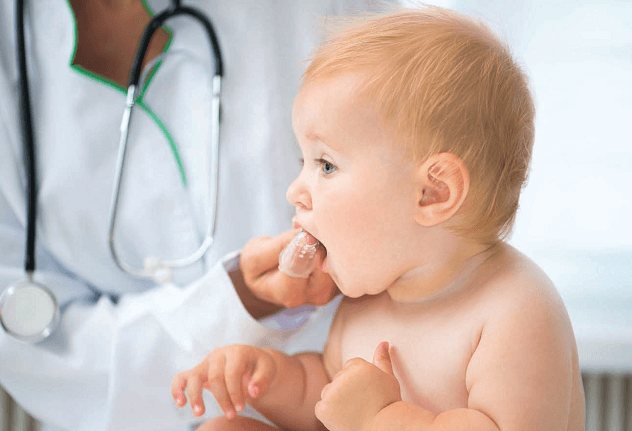
It is impossible to say how long diarrhea lasts during teething. It depends on the characteristics of the child’s body. However, it is possible to alleviate the baby's condition with frequent bowel movements with the help of medications.
For profuse and frequent diarrhea, Regidron is recommended, as well as Imodium, which reduces intestinal motility. You can maintain the state of the microflora during this period using Linex. However, it is worth remembering that drugs should only be prescribed by a pediatrician.
You can relieve sore gums with the help of hard vegetables and fruits: carrots, cucumbers, hard apples. You can also give your child special teethers in the form of toys. It is important to remember that everything that the child puts into his mouth at the time of teething must be thoroughly washed.
It is also recommended to use local medications for pain relief, which are applied to the gums. Among them we can highlight Kamistad, Kalgel. Read more: gel for teething gums→
In case of severe pain, it is necessary to give the child Nurofen in the form of syrup.
To normalize your baby's stool, it is worth including strengthening foods in the diet. These include:
- rice and rice water;
- mashed potatoes;
- decoction of dried pears;
- jelly;
- bananas;
- crackers.
When teething, the baby experiences diarrhea and fever, as well as other symptoms. Therefore, it is important for parents to help their baby cope with the body’s unpleasant reactions to the appearance of teeth. There should be emergency response equipment at hand, as well as a pediatrician’s phone number.
If an intestinal infection occurs, you must immediately go to a specialist to eliminate the risk of complications.
Author: Yana Martynenko, especially for Mama66.ru
Prevention
If diarrhea appears during the eruption of the first tooth, then, most likely, this unpleasant phenomenon cannot be avoided in the future. Therefore, after detecting the first symptoms of the appearance of another tooth, it is necessary to prevent digestive disorders.
Experts recommend:
- Strictly observe the rules of personal hygiene, wash your hands often and keep things around the child clean.
- Stop introducing new products into complementary foods, as well as into the diet of a nursing mother.
- Buy teethers and, if necessary, give them to the child, having previously disinfected them.
- Do not insist on eating solid food. It is better to feed your baby breast milk or formula.
- During periods of acute pain, apply special gels to the child’s gums.
After consulting with your pediatrician, you can also use traditional medicine. For example, infusions of chamomile and sage flowers can soothe the digestive system. In addition, they also have an antibacterial effect, which creates an additional barrier to the penetration of infection into the child’s body.
In addition to the physiological cause of indigestion on the teeth, there is also its most common cause - dirt. The child tries to scratch his irritated gums and puts everything in his mouth. Often these items are of questionable purity, so there is a high risk of dangerous bacteria entering the digestive tract. A vicious circle develops: additional intestinal infection will worsen diarrhea and poor health of the baby.
To prevent the development of an infectious disease, it is necessary to ensure the implementation of preventive measures:
- Wash your baby's hands more often.
- Treat toys with boiling water daily.
- Soft toys should be hidden temporarily; many microorganisms accumulate in their porous structure.
Prevention measures include: frequent cleaning of the children's room, treatment of bed walls that the child may bite, and personal hygiene by adults caring for the baby.
